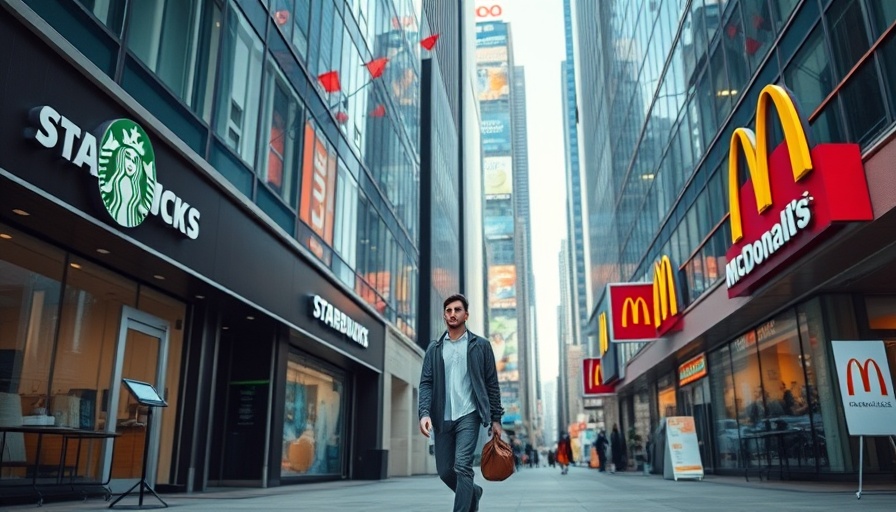
McDonald's Overtakes Starbucks: What This Means for the Restaurant Industry
The longstanding rivalry between McDonald's and Starbucks has taken an unexpected turn. For the first time in eight years, McDonald's has dethroned Starbucks as the most valuable restaurant brand in the United States, a shift that signals significant changes in consumer preferences and market dynamics. With its brand value rising to $40.5 billion—a marked increase of 7%—and Starbucks' value plummeting by 36% to $38.8 billion, this development goes beyond raw numbers to reflect evolving dining and social environments.
Understanding the Shift: Why McDonald's is Winning
At first glance, it seems counterintuitive: why would McDonald's, known for its burgers and fries, succeed in a realm which Starbucks has long dominated—the coffee experience? Starbucks has spent years branding itself as more than just a place to grab coffee; it’s cultivated a 'third place' atmosphere where consumers gather for relaxation and social interaction. However, McDonald's has spent recent years making a concentrated effort to blur those lines.
McDonald's strategic investment in its McCafé line has been crucial. By enhancing the quality of its coffee offerings and establishing free Wi-Fi at many locations, McDonald's is effectively creating a casual meeting space for consumers. This positioning gives it a unique advantage in the breakfast segment, where coffee is a cornerstone of customer engagement. In essence, McDonald’s is reshaping its identity—not just as a fast-food restaurant, but as a versatile venue suitable for coffee lovers and families alike.
The Price Argument: Coffee Quality Meets Affordability
One of the deciding factors in this brand value shift appears to be pricing. McDonald's now offers a cup of coffee that's not just reasonably good but potentially better than what consumers would expect from Starbucks, and at a fraction of the price. This is a smart move in an economy where value matters greatly to consumers. With the price of a regular brewed coffee often falling significantly below that of Starbucks, many consumers may be opting for McDonald's, leading to increased foot traffic and sales in what is typically a high-margin category.
Starbucks’ Struggles: A Cultured Icon in Trouble?
Meanwhile, Starbucks finds itself in what can be described as a challenging phase. Customer complaints surrounding long wait times, perplexing menu choices, and a store experience that has not always met consumer expectations have surfaced. To address these issues, Starbucks appointed Brian Niccol, previously of Chipotle fame, to implement a turnaround strategy. While initial steps such as reinstating free refills and eliminating charges for milk alternatives mark improvement, restoring brand perception could require more time and consistent effort.
Consumer Behavior: The Game Changer
The shift between these two giants is indicative of broader trends in consumer behavior. Today's consumers—particularly younger demographics—seek convenience and value in their dining experiences. The rise of third-wave coffee shops and fast-casual dining has made consumers more discerning about their coffee and food choices. They are drawn to venues that deliver on quality and ambiance without excessive price tags.
As McDonald's successfully marries quality coffee and quick service, the question arises: is it possible for a fast-food chain to replace the cultural significance of a local coffee shop? While that seems unlikely, McDonald’s is clearly expanding its appeal to those who need a quick coffee fix along with a side of fries.
The Future: A Long Game of Brand Loyalty
Brand loyalty in the restaurant sector is increasingly predicated on how well establishments can adapt to customer demands. McDonald's has proven that through quality service, better products, and a redefined customer experience, it can challenge the status quo. Moving forward, the battle between McDonald’s and Starbucks will likely influence other restaurants’ strategies, urging them to reassess their offerings and branding approaches.
Conclusion: What Lies Ahead
As both brands carve their paths in an evolving marketplace, consumers will benefit from innovation and competition. The rivalry, once thought to be firmly in Starbucks' favor, has sparked a potential paradigm shift worth watching. For institutions entrenched in tradition, the takeaway is clear: adaptation and consumer engagement will define their success in this fluctuating landscape. What do you think—will McDonald's sustain this momentum? Or can Starbucks reclaim its throne and redefine its place in the industry once again?
 Add Row
Add Row  Add
Add 




Write A Comment